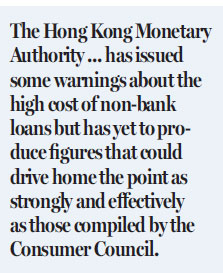Non-bank mortgage loans a time bomb in the making
Updated: 2017-09-22 06:05
(HK Edition)
|
|||||||||
Homebuyers who secured financing on "generous" terms from lending companies associated with property developers would be shocked to find out how much more they have to pay in interest compared with regular bank mortgage loans.
The latest revelation from the Consumer Council showed the total interest cost of a 20-year mortgage loan from a lending company to finance 90 percent of the HK$8 million purchase price of an average-sized apartment would amount to a whopping HK$5 million.

Of course, banks are restricted to lending no more than 70 percent of the purchase price in mortgage financing. A buyer of an apartment of similar price who can afford the 30-percent down payment to secure a bank loan at a lower credit cost would only have to pay less than HK$2 million in interest, the council's report showed.
Apparently, the vast difference in mortgage interest charges between lending companies and banks is not well known to many homebuyers. Recent market studies have shown a rapid increase in non-bank mortgage lending as home prices continued to surge.
The Hong Kong Monetary Authority, the city's de facto central bank, has issued some warnings about the high cost of non-bank loans but has yet to produce figures that could drive home the point as strongly and effectively as those compiled by the Consumer Council. On this matter, the central bank can find a convenient excuse. The supervision of non-bank lenders does not come under its jurisdiction.
But as a de facto central bank, which has the added duty of supervising banks, it is wrong to shirk its moral responsibility by hiding behind a veil of bureaucracy. Central banks in other developed economies are often seen to take an active and upfront role in addressing financial issues that have a direct impact on public interests.
The question is whether there is any justification for Hong Kong to continue wasting large sums of public funds every year in maintaining a central bank which, in essence, is not really a central bank. The duties of the HKMA - managing the linked exchange rate system, investing the exchange fund and, yes, supervising banks - can be carried out just as effectively and at much lower costs by the relevant government departments within the finance branch.
It doesn't really take much professional skill to manage the linked exchange rate system as long as it is backed, as is the case in Hong Kong, by large fiscal reserves and a highly disciplined budgetary policy. Critics have argued that it would be more profitable to entrust the exchange fund to professional fund managers with credible investment records. In most other developed economies, supervision of banks is a separate function outside the central bank to avoid any potential conflict of interest.
Instead of taking the initiative, the HKMA allowed the lowly (in terms of budget) Consumer Council, which doesn't even have legal teeth, to expose the real cost of those mortgage loan terms that have been described more than once by the gullible media as "generous" to the borrowers. To be sure, the disclosure, illustrated by figures and tables, is not going to kill off those loans. They are the only option to prospective homebuyers who cannot afford the high deposits to secure bank mortgages.
It is hoped that awareness of the high interest costs for non-bank financing can discourage others from being misled to make long-term commitments that are clearly not in their interests.
More important, the proliferation of high-interest non-bank mortgage loans could greatly magnify the impact of a sharp correction in property prices which many economists have warned is long overdue. Those borrowers of low-deposit loans would be the ones to find themselves caught in the negative-equity dilemma and the high interest costs of such loans could force them to opt for default.
The resultant fallout would threaten the integrity of the banking system because banks are a major funding source of many non-bank lenders. The Consumer Council has done its job, though belatedly. Now is the time for the HKMA to act.
The author is a veteran current affairs commentator.
(HK Edition 09/22/2017 page1)